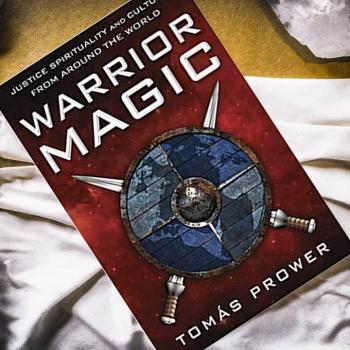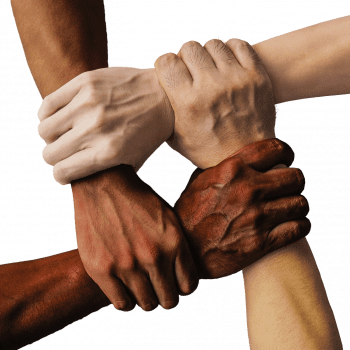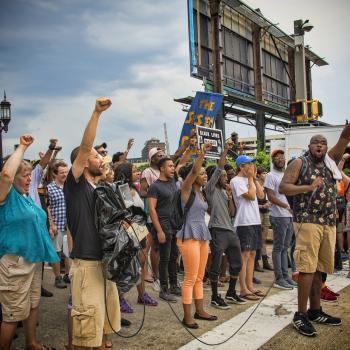The past few weeks have been difficult in my house, as the news of Ferguson and New York killings of black men by white police officers continue to make headlines. This news offers parents a unique opportunity to discuss these weighty social issues with their children.
Family Coven Virtues
What are your family coven virtues? In this past article, I discussed how a family coven can set up family coven virtues and then use those virtues to parent. Whenever you think about topics like social injustice and institutionalized racism, start by examining what your family’s virtues are and how these issues impact them.
Dragonstone Family Coven’s virtues are tolerance, humility, devotion, patience, kindness, respect, courage, efficiency, discernment, trustworthiness, reverence, and helpfulness. For this article, I will be referring to these virtues.
Clarify the Problem
Depending upon the age of your child, you will approach these issues differently. Your approach will also depend upon which type of psychological system your child best responds to. Children from birth to 2 years old might be best served by doing things for others. Going to rallies, holding signs, candle light vigils, and are placing candles where horrible violence has occurred are all appropriate activities for this age group. It is the act of going and doing something that is most important.
For children ages 2 to 5, a discussion around the virtues as they apply to the news you are discussing is also important. In the case of Ferguson, it would be appropriate to talk to your children about discernment. What does that word mean and how is it applicable in this case? Some discussion topics might include:
- Can you tell me how many children in your class are black (white, Asian, Native Indian, other colored)?
- Why do you think this is? (social and economic make up of where you child goes to school)
- Do you think it is like this everywhere?
If you are taking your children to rallies, talking about peaceful protest for change, the history of peaceful protest in the United States, and what virtues peaceful protest mimics (courage, respect, kindness, devotion, efficiency, helpfulness) is also an excellent discussion.
From ages 5 to 8, children’s focus is more self-centric. They are curious how the news affects them specifically and how daily actions can translate into worldwide events. Talking to children about race and how bullying and race often go hand in hand is an excellent topic of discussion. Talk about everyday actions. Some discussion topics might be:
- How many children of color are you friends with at school? Why?
- Do you think the teachers are meaner to children who are of color than white children? Why?
- What can you do at school to lessen the impact of racism?
Children ages 8 to tween begin to be desensitized by the bombardment of news and social media input into their lives. For this age group, I would insist on watching or listening to a news program about the issues and then beginning discussion on one specific topic. Limiting the focus to one topic helps to focus the child’s attention. Some discussion topics might include:
- Do you think you are privileged? How?
- Does your privilege lead you to be racist or sexist?
- What can you do to impact the school you go to and help even out racism and sexism that may be happening there?
When dealing with teenagers, you typically wind up with two types of teens. One type is proactive and involved, believing that they personally have an ability to change the world in which they live. They may see the discussion around Ferguson and New York as exhilarating and interesting. The other type of teenager may come to the table with a belief that the events in Ferguson and New York are beyond the scope of their lives and have little to do with their day to day interactions with others. They may come to a place where they feel frustrated, like there is nothing they can personally do that would make the situation any better.
Either group can become defensive if they feel that you are talking specifically about them when you are discussing general trends. Be aware of this possibility and steer young adults away from this thinking when you observe it.

For teenagers, having any conversation about these events is important, and it is also important to work on their communication skills while you do so. Ensuring that your child is saying what they mean and meaning what they say is an important life skill that will serve them going forward.
Asking teenagers what they would or wouldn’t do in similar situations as the victims and the police is another tool to try to move the teenager into thinking from the first person regarding these situations. For black men, especially, a discussion about what to do when faced by police is important. My son has been instructed to do whatever police tell him to do and give his ID willingly, and if he is confused, simply demand a lawyer repeatedly.
Unfortunately, the likelihood that my white male child will need this information is small. However, since he began attending a magnet school, I have discussed with him what to do when riding in a car full of teenagers of various races as he often does on the way home from school. Basically, the advice is the same with an added suggestion that he tell all his friends to behave in a similar manner, deferring to adults to sort the situation out.
When faced with my son’s frustration and hopelessness, I sought the advice of his aunt, Crystal Blanton, pagan author and social activist.
“Validate that sense of hopelessness,” she told me. “That sense of hopelessness is the first step to action because it shows a full understanding of the scope of the problems faced.”
Blanton went on to explain that it is the sense of hopelessness that often leads to revolutionary action. “When people are desperate and hopeless, revolutions happen.”
She suggested we talk to my son about how that feeling can be transmuted into action and how any action toward change is important. “No one person’s actions change everything. Every person’s actions will change something,” she reminded me.
Faced with a teenager whose life experience is limited, I have encouraged him to live social justice in his daily life. When he judges people by the content of their character and not their skin, he can create change that reverberates throughout the universe. This action has an energetic effect well beyond his immediate sphere of influence.
Blanton and I went on to discuss the developmental differences in children and how they also impact a parent’s ability to talk about social justice issues. “Next to experience, watching a child come up to an abstract idea and not be able to mentally take the next leap is frustrating for them and for the parent,” I observed.
“Yes,” Blanton concurred. “A lot of this is parenting to develop critical thinking skills and helping the child increase their capacity to think critically about what is happening around them instead of parroting what they hear in the mainstream media.”
Parents should understand that children develop differently and their experiences also color their perception of problems like Ferguson. Don’t push your child if they don’t agree with you one hundred percent all the time. Walk them through the process of thinking about the issues without having a judgement about how they should think about those issues. This helps them develop and utilize critical thinking skills that are part of long term mental development. Questions that can be asked to help develop critical thinking skills include:
- What makes someone powerful?
- Why do people think differently about different types of people?
- What makes up stereotypes?
- How are stereotypes created?
- How does the child uphold or reinforce stereotypes?
Birthing Hereditary Witchcraft is published occasionally on Agora. Subscribe via RSS or e-mail!

















